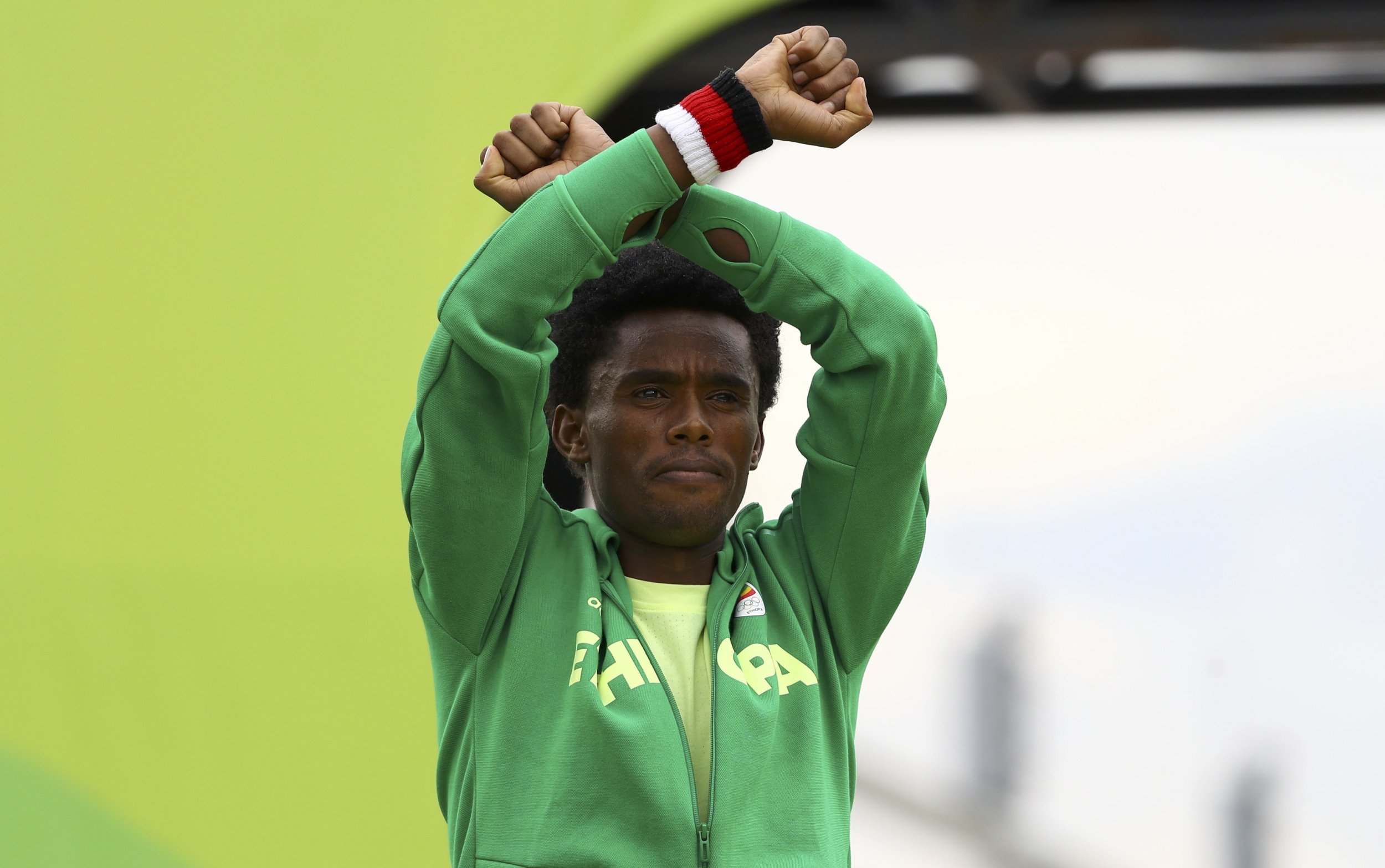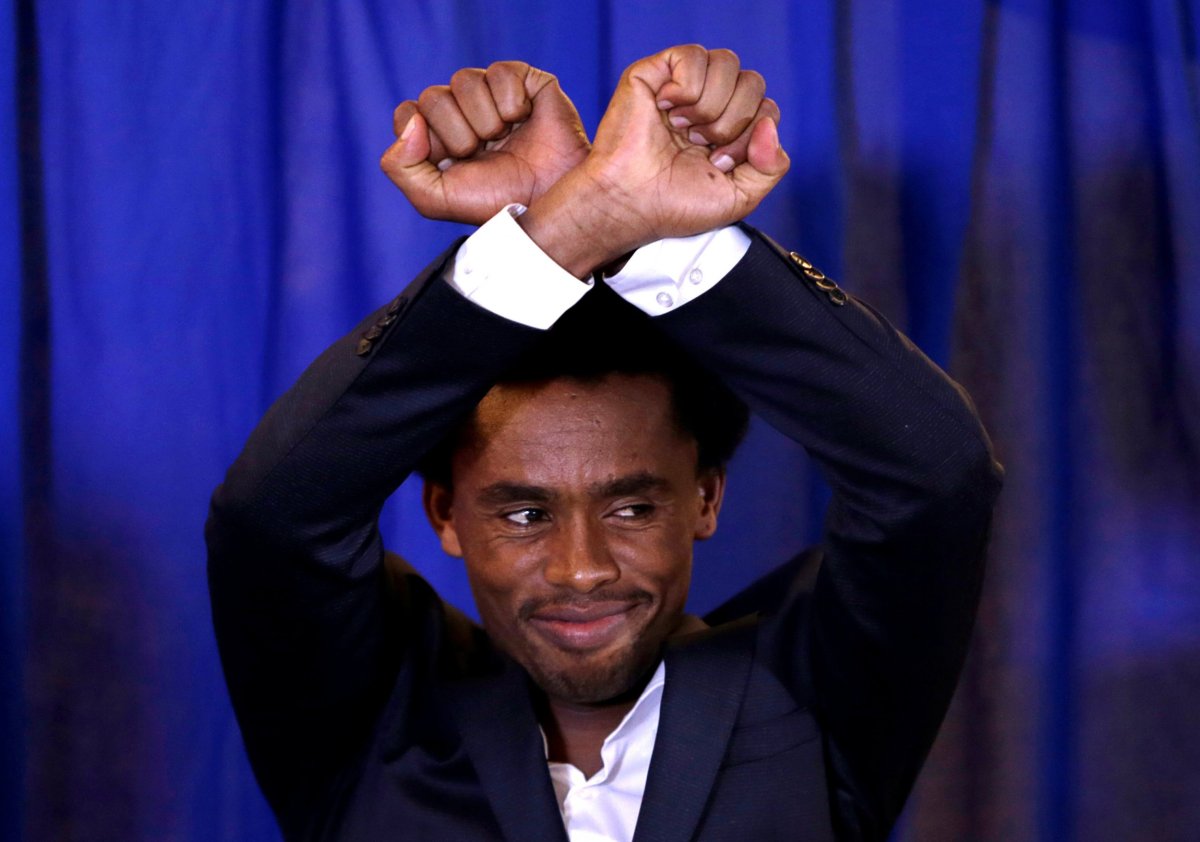
Updated | Ethiopian Olympic silver medallist Feyisa Lilesa is calling on the international community to do more to stop the alleged persecution of Oromo people.
The 27-year-old athlete, who is an ethnic Oromo, made headlines last year after he crossed his arms over his head as he passed the finish line in the marathon race at the Rio 2016 Olympics. The gesture is a symbol of resistance Oromo people widely used during anti-government protests in Ethiopia in 2016. Making up 34.4 percent of the country's 102 million people, the Oromo are Ethiopia's largest ethnic group.
Demonstrations broke out in the Oromia region in November 2015 and later spread to the Amhara region, northwestern Ethiopia, growing into what has been considered the biggest anti-government unrest in Ethiopia's recent history and prompting the country to declare a state of emergency —still in place today—that put an end to the protests.
People initially protested over government plans to expand the territory of the Ethiopian capital Addis Ababa, with farmers raising concerns that increasing the size of the city would lead to forced evictions and loss of farming land.
The government later scrapped the plans, but protests continued. Many Oromo people argued for a greater inclusion in the political process, saying they had been marginalized. Protesters also called for the release of political prisoners.
Oromo protesters claim the government is dominated by the Tigray minority, who make up 6.2 percent of the total population.
The country is ruled by the Ethiopian People's Revolutionary Democratic Front, a coalition of four political parties that includes the Oromo Peoples' Democratic Organization.
Last year, in a substantial cabinet reshuffle, Prime Minister Hailemariam Desalegn appointed 21 new cabinet ministers, giving prominent ministerial roles to two members of the Oromo ethnic group.
Rights groups have often accused Ethiopia of arresting and subjecting political activists and opposition leaders to unfair trials. In 2013, Human Rights Watch (HRW) alleged Ethiopian authorities had subjected political detainees to torture and other ill-treatment at a detention center in Addis Ababa. The government denied the allegations and deemed the report as "extremely biased and ideologically marred," according to the BBC.
Speaking to Newsweek after running the London Marathon on April 23, Lilesa alleged the Ethiopia is still targeting Oromo people who call for a greater recognition of their rights.
Referring to security forces known as "Liyu Police," present in Oromia and the Ethiopian Somali Regional State, Filesa says: "The government has [deployed the police] to give an impression that there is a border conflict between Somali and Oromo people, but in reality it is targeting Oromo people. The world has not done much, even when the country declared the state of emergency in October 2016. The response of the international media, so far, has been unsatisfactory. The world must know the persecution of Oromo people is continuing, but it just has another form now."
Rights groups have previously accused the Liyu Police—created in 2007—of being "implicated in extrajudicial killings, torture, rape, and violence against people in the Somali region [Ethiopian Somali Regional State, bordering Oromia state] as well as in retaliatory attacks against local communities." In March, HRW said there was "growing evidence of attacks by the group [ Liyu Police] against communities outside of the Somali region, including in the Oromia region since late December 2016."
The Ethiopian embassy in London told Newsweek: "The Oromia Regional State and the Ethiopian-Somali Regional States had signed an agreement, recently following consecutive public consultations at local community level, on how to develop and implement joint development projects in the border areas to ensure mutual and lasting benefits for all people living in the adjacent areas.
"The public consultations and agreement reached by the regional state governments is a living witness to the long-standing co-existence and tolerance between the Oromo and Ethiopian Somali people."
Lilesa knew his protest gesture at the Rio Olympics would come with a price: Following the end of the marathon, he applied for a visa to enter the U.S., claiming his life would be at risk if he returned to his homeland.

However, the athlete—who has a special skills visa and lives with his family in Arizona—told Newsweek he has no regrets.
"There is nothing I regret about my protest and I consider what I did as a very small thing, compared to the sacrifices paid by the youth in the course of the Oromo struggle," he says.
The Ethiopian government has always maintained that Lilesa and his family are welcome to return to Ethiopia, where it says nothing would happen to them. However, Lilesa does not trust the Ethiopian authorities.
"I love my country and If I am asked to represent Ethiopia the next time I run a marathon, I will be happy to do so, but there is an oppressive regime in the country right now and until it changes, I will not go back," he claims.
"Even if they say nothing would happen to me and my family, I don't trust them. For example, Merera Gudina [leader of the Oromo People's Congress] was arrested after he came back from a meeting with members of the European Parliament in Brussels. I suspect he was arrested at least in part because he was seen with me and [Deputy Chairman of the four-party Coalition for Unity and Democracy created to compete for seats in 2005 general elections ] Berhanu Nega. "
The unrest in Ethiopia resulted in the deaths of 669 people, including 63 policemen, since November 2015 according to a report released by Ethiopia's Human Rights Commission earlier in April.
Rights groups have accused security forces of killing hundreds of people, opening fire on unarmed protesters and arbitrarily arresting protesters, journalists and human rights defenders during the protests. However, while the country's Human Rights Commission recommended prosecution of some police officers, it maintained that the overall response by security forces was adequate.
Rights groups have voiced concerns about the commission's report, suggesting it fails to give an accurate picture of the security forces' responsibility for the casualties. "The conclusion that security forces used appropriate levels of force in most situations is in stark contrast to what every other organization who has investigated has found," Felix Horne, Ethiopia and Eritrea Senior Researcher at Human Rights Watch told Newsweek.
Last year, the United Nations and the European parliament called on Ethiopia to allow " an international commission of inquiry to investigate the protests and the violence," but Desalegn rejected such calls in April, AP reported.
Lilesa believes his people have been unfairly targeted for making what he defined as "modest demands" and he vowed to continue to protest until such demands are met. "Oromo people have been rid of their land and houses and when they expressed their grievances, thousands were killed," he alleges.
Members of the Oromo community have often claimed the government evicts their lands. Rights groups have accused Ethiopia of forcing tens of thousands of people off their land so that it can be leased to foreign investors.
However, the government denies the allegations. "I can tell you that it is baseless—on both grounds—on both the land grab issue and resettlement of the people," Ethiopian Information Minister Bereket Simon told the BBC World Service in 2013.
"People have not been asking for independence, but just for a broader recognition of their rights and, for this, they have been killed. These are modest demands, yet, they have been killed. The gesture of crossing my arms over my head means no more persecution, no more land grabbing, no more rights abuses and my wish is that Oromo people will be finally granted their rights," Lilesa says.
A spokesperson for the embassy denied the allegations. "These are, as usual, unsubstantiated claims, a way to romanticize what happened. [Lilesa] is entitled to express his opinion, he can say anything. He can return to Ethiopia and no-one would touch him. But the problem is that there are radical people behind this and the diaspora is using him for their own political agenda," he says.
Speaking about the state of emergency in Ethiopia, the spokesperson adds: "The state of emergency has been amended twice since October following the restoration of law and order in most areas of the country. For instance, the prohibition on unauthorized movements around critical infrastructure facilities and factories has been repealed; restrictions related to searches and arrests without court orders have been lifted, as well as travel restrictions for diplomats.
"In addition, the restriction of printing and broadcasting of noxious media content, displaying of placards which were used illegally to incite citizens through the internet, mobile, in writing, on television, radio or any other means of communication have been rescinded," he continues.
This article has been amended to update an embassy statement on the Oromia Regional State and the Ethiopian-Somali Regional States.
Uncommon Knowledge
Newsweek is committed to challenging conventional wisdom and finding connections in the search for common ground.
Newsweek is committed to challenging conventional wisdom and finding connections in the search for common ground.
About the writer
To read how Newsweek uses AI as a newsroom tool, Click here.








